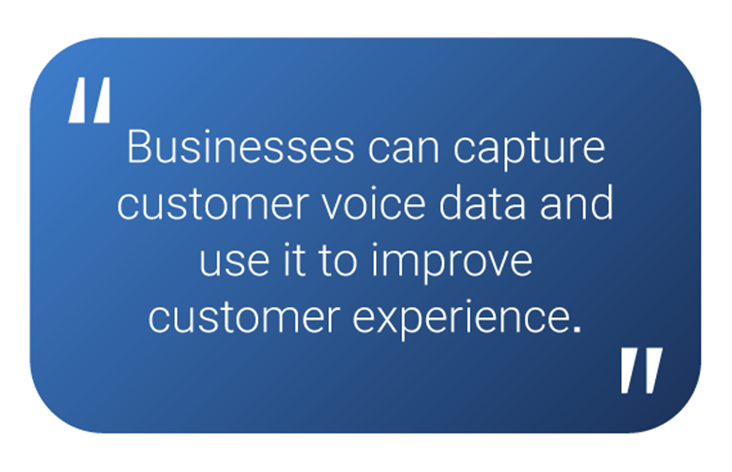Modernizing Your Contact Center for Better CX and ROI
What does great customer service look like? It’s delivering timely solutions that leave customers satisfied.

Today’s companies are more motivated than ever to offer a modern customer experience (CX) that helps them retain customers and build loyalty. A modern customer experience utilizes AI and other intelligent tools to deliver personalized CX.
Conversational AI is the driving force that helps decision-makers deliver personalized customer service. Conversational AI adds a layer of intuition and intelligence across communication channels to help provide the modern customer experience your customers crave. And it does so by taking advantage of natural language processing (NLP), machine learning (ML), deep learning, and contextual awareness.
Your company’s commitment to improve customer experience impacts customer loyalty and retention.
Before we dive in, let’s hit refresh on a few key terms.
Customer Experience: Customer experience (CX) covers the whole customer journey, including the perceptions and feelings caused by customer service interactions. CX consists of all interactions a consumer has with the company. This includes communications through the contact center, in store, online, and while using a product or service.
Conversational AI: We define conversational AI as a form of intelligence that facilitates real-time, human-like communication between a person and a computer. Conversational AI is not a single technology. It combines technologies that replicate natural human language to facilitate intuitive interactions and personalized customer service.
Personalized Customer Service: Personalized customer service is when a brand tailors service and support based on a customer's unique needs and preferences. Personalization extends to the customer journey and has become a key differentiator of a modern customer experience.
Intelligent Virtual Agent: An intelligent virtual agent (IVA), also known as a virtual agent, is an AI-enabled communication tool that generates personalized responses to users. IVAs are intuitive and can understand natural-language requests through conversational AI. They enable companies to provide the personalized customer service mentioned above.
Conversational AI can help you improve customer experience. Its value centers around the ability to offer personalized customer service through convenient and intuitive access to information and assistance.
Here are five ways conversational AI will help you improve customer experience.
Personalized customer service seeks to gain an understanding of your customers’ preferences on an individual basis. Decision makers can program AI-enabled IVAs to understand specific words and phrases customers use. The tool can then use that information to provide customized responses.
Conversational AI also utilizes ML to deliver personalized customer service. Using ML algorithms, developers can enable IVAs to analyze data about a customer's past interactions with the company. This data might include products or services that the customer has purchased, the types of questions they’ve asked, etc.
IVAs can then customize recommendations or tailor responses based on those past interactions and preferences.
Customer voice, also known as the voice of the customer, is a combination of a customer’s needs and experiences with your brand. Persona, expectations, and understandings are all aspects of customer voice, which is a valuable metric for brands seeking to improve customer experience. By identifying areas with room for improvement, conversational AI helps decision makers refine their CX strategic planning.
Using text and sentiment analysis, conversational AI can review conversation histories in order to take into account the voices of your individual customers.

Not much is more frustrating than routing yourself through a phone tree and waiting on hold only to finally speak with an operator who can’t actually help you. Fortunately, IVAs help reduce frustration and improve customer experience on multiple fronts.
First, IVAs help expedite customer service because they’re available 24/7 and can handle several customer inquiries simultaneously. Second, through conversational AI and ML, IVAs can discern a customer’s needs and direct them to efficient self-service options. And third, if none of those self-service options are suitable, IVAs will then route the customer to the best-fit agent so they can resolve issues during the first interaction.
71% of today’s consumers say the most important thing a company can do to improve customer experience is to value customers’ time. Channel flexibility (or multichannel CX) helps companies demonstrate that value by connecting with customers via their preferred channels.
On a busy day when contacting customer service is squeezed in, having the ability to choose how you communicate with a brand is incredibly valuable. That flexibility also helps inspire long-term loyalty.
But actually offering your customers that desired level of control is an incredibly complex undertaking. Fortunately, well-designed conversational AI delivers both multichannel strategy and channel flexibility.
Intelligent tools like IVAs deliver human-like messages to customers across channels (e.g., phone, email, and social media). Companies can use the technology to automate common customer inquiries, minimize wait times, and improve customer experience.
Let’s say a serious prospect is browsing your site or online store. Here’s how multichannel CX powered by an IVA might alter their customer experience:

Just like a human agent, conversational AI tools like IVAs hold natural conversations. IVAs can walk customers through support processes in a way that feels organic and lends to personalized customer service. Customers don't feel like they're communicating with a machine.
For example, a streaming customer can call a contact center to request information about new shows. They can also request changes to their subscription. These conversations feel intuitive, natural and personalized.
Conversational AI can also detect slang words and regional vocabulary. This capability allows the IVA to communicate with a customer on their level in ways they can easily understand.
IVAs help brands create a modern customer experience. But conversational AI products like Mosaicx also help your agents help your customers.
They strengthen the employee experience because fully automated self-service options reduce the burden on human agents, which frees them up to handle more complex support tickets. Agents equipped with Mosaicx are well-positioned to take advantage customer voice data, personalize the service they provide, and help elevate your brand’s overall customer experience.

What does great customer service look like? It’s delivering timely solutions that leave customers satisfied.

Every conversation with a customer leaves clues about what they actually want. They don’t always have to say it out loud that a certain feature needs...

Your business interacts with customers across multiple channels. However, if these interactions are not connected, they prevent consistent service...